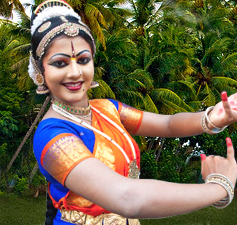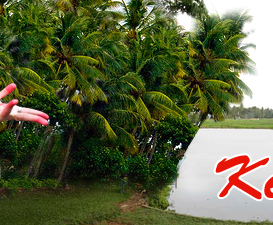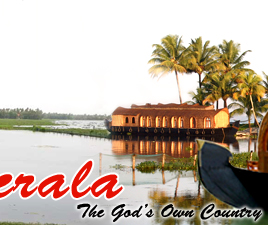Koodalmanikyam Temple is a Hindu temple located at Irinjalakuda in Thrissur/Trichur district of Kerala, India. Koodal Manikyam is renowned for being the only temple in India, where Bharata (one of the brothers of Lord Rama) is being worshipped. In this temple, the deity has been depicted as a sage rather than Bharata as a prince. In this temple, Bharata is called Lord Sangameshwara. Koodalmanikyam is one of those four set of temples, which are together called ‘Nalambalam’. Each of the four temples is dedicated to four brothers in the Ramayana epic, namely Rama, Bharata, Lakshmana and Shatrughna.
Koodal Manikyam is the Malayalam version of the Sanskrit word ‘Sangameswara’. The temple is spread across 10 acres of land with beautiful gateways on the East, South and West. The Gopuram in the eastern entrance has been built according to typical Kerala style of architecture. Its tiled roof and white washed walls adds more charm to the temple. Front wall of the entrance is embedded with number of eye-catching prehistoric figures. Huge and spacious courtyards on the Eastern and Western ways to the inner temple provide accommodation to around twenty-one elephants.
Establishment
Like any other temple, Koodalmanikyam Temple also has some interesting legends. As per a popular legend, once the deity was found to radiate light from its forehead. The local people were unable to find out the reason of gleam of the idol. Few of them brought Quartz that belonged to the king of Kayamkulam for comparison. It is said that while comparing the deity and the Quartz, the stone strangely slipped out from the hand and merged into the deity of Bharata. In this way, the merging of two Manikyam happened and thus, the temple came to be known as Koodalmanikyam. Establishment of this temple is an important chapter in the history of its location - Irinjalakuda, as most of the land in and around Irinjalakuda has been possessed by Koodalmanikyam temple.
Key Features:
Koodalmanikyam Temple boasts of magnificent architecture of red tiled roof and white washed walls. The tradition of performing five Poojas and three Sivelis in a day has been followed in most of the Hindu temples in Kerala. However, Koodalmanikyam, Usha Puja and Pantheeradi Puja are not performed. The idol is taken out only during the annual festival for traditional procession. This is the only temple where Deeparadhana is not done. There are four ponds in and around the temple. Kuttan Kulam is the largest pond that is situated outside the compound on the eastern side, whereas Kulipini Theertham is located inside the compound. Kulipini Theertham, another pond which is believed to be blessed by the sage Kulipini Maharshi, is also located in the temple premises. All the three ponds other than Kulipini Theertham are opened to the devotees. Koodal Manikyam Temple represents captivating gateways, round shaped Sanctum Sanctorum, the majestic Koothambalam and pretty carvings. Owing to these factors, the temple stands as a main centre of sustenance of the Temple Arts of Kerala.
How to Reach Koodalmanikyam Temple:
Koodalmanikyam Temple is easily accessible from any source of transportation within the district. The temple is 45 km away from Nedumbassery International Airport in Kochi. If one wishes to travel by rail, then there is a railway station at Irinjalakuda. The town is located on 9 km away from railway station. There are also buses services to the temple like from Kochi. Those who come from Kozhikkode side can switch to private bus at Moonnupeedika, while those who come from the south via NH 17, may board busses plying through Kodungallur-Thrissur route at Kodungallur and get down at Irinjalakuda, to reach Koodal Manikyam Temple.
Go through the article and read about Koodalmanikyam Temple, which is located at Irinjalakuda in Thrissur/Trichur district of Kerala.
Kerala Tourism : Temples in Kerala : Koodalmanikyam Temple
Koodalmanikyam Temple
| Location | Irinjalakuda, Thrissur district, Kerala, India |
| Nearest Airport | Nedumbassery International Airport, Cochin |
| Nearest Railway Station | Railway Station at Irinjalakuda |
| Best Time to Visit | April-May October-November |




